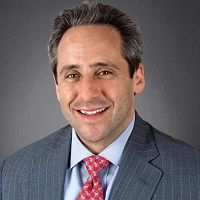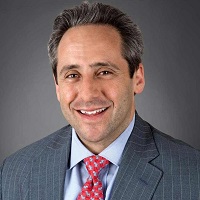Like Getting Healthy, Getting Wealthy Requires Good Habits
Building your financial health and an adequate retirement nest egg can most reliably be achieved through commitment, discipline, routine and accountability.


Profit and prosper with the best of Kiplinger's advice on investing, taxes, retirement, personal finance and much more. Delivered daily. Enter your email in the box and click Sign Me Up.
You are now subscribed
Your newsletter sign-up was successful
Want to add more newsletters?

Delivered daily
Kiplinger Today
Profit and prosper with the best of Kiplinger's advice on investing, taxes, retirement, personal finance and much more delivered daily. Smart money moves start here.

Sent five days a week
Kiplinger A Step Ahead
Get practical help to make better financial decisions in your everyday life, from spending to savings on top deals.

Delivered daily
Kiplinger Closing Bell
Get today's biggest financial and investing headlines delivered to your inbox every day the U.S. stock market is open.

Sent twice a week
Kiplinger Adviser Intel
Financial pros across the country share best practices and fresh tactics to preserve and grow your wealth.

Delivered weekly
Kiplinger Tax Tips
Trim your federal and state tax bills with practical tax-planning and tax-cutting strategies.

Sent twice a week
Kiplinger Retirement Tips
Your twice-a-week guide to planning and enjoying a financially secure and richly rewarding retirement

Sent bimonthly.
Kiplinger Adviser Angle
Insights for advisers, wealth managers and other financial professionals.

Sent twice a week
Kiplinger Investing Weekly
Your twice-a-week roundup of promising stocks, funds, companies and industries you should consider, ones you should avoid, and why.

Sent weekly for six weeks
Kiplinger Invest for Retirement
Your step-by-step six-part series on how to invest for retirement, from devising a successful strategy to exactly which investments to choose.
Amid the vast landscape of financial advice available online and elsewhere, one message is indisputably accurate — the importance of starting early when it comes to getting wealthy. The sooner you begin setting aside money for retirement, the greater your ability to compile a sufficient nest egg, take advantage of compounding interest and handle any unexpected setbacks along the way.
But there’s an important connection between financial, physical and emotional health that often goes unmentioned. It’s one that younger investors could particularly benefit from understanding and that financial advisers should integrate in order to provide a more holistic service.
Healthy habits or routines formed early in life tend to persist over time, and people who are healthier will likely live longer. The great blessing of a long, healthy life comes with the great responsibility of needing to save more to enjoy those later years.
From just $107.88 $24.99 for Kiplinger Personal Finance
Become a smarter, better informed investor. Subscribe from just $107.88 $24.99, plus get up to 4 Special Issues

Sign up for Kiplinger’s Free Newsletters
Profit and prosper with the best of expert advice on investing, taxes, retirement, personal finance and more - straight to your e-mail.
Profit and prosper with the best of expert advice - straight to your e-mail.
Thanks to advances in medical technology and health care, we could soon see an era where many people live well into their 100s and are potentially less limited by the hip, knee and back ailments that have historically plagued older Americans. This would mean significantly more retirees who continue to travel, play golf and participate in other recreational activities — creating a higher need for comprehensive financial planning to support these pursuits.
Importance of advice
According to a report by the Pew Research Center in 2021, concerns about personal health and financial security are directly correlated to elevated levels of psychological distress. The correlation between emotional, physical and financial health is also reflected by how each can be negatively impacted by uncertainty, along with the subsequent stress and anxiety it breeds. From a financial standpoint, uncertainty often stems from a lack of planning and prioritization.
For various reasons, many people are less likely to pay for financial advice than physical or emotional advice. Consider the example of a fitness coach or trainer. That person offers guidance on proper form when exercising, helps ensure that you avoid certain movements that might cause injury and provides accountability.
It’s common knowledge that people need to eat right and exercise in order to enjoy good physical health. However, some people pay for a trainer for the accountability since they probably wouldn’t exercise much otherwise.
Similarly, when people seek therapy, it’s often because they feel unheard in certain aspects of their life or need help processing complex emotions. Therapy can be a great way to address issues that one may be struggling with, and it’s very gratifying to know that someone is listening and cares.
What do financial advisers provide? Essentially the same services as physical or emotional health professionals. They offer coaching on good form, in the sense of effective ways to achieve financial health. This includes guidance on how to avoid getting financially hurt, through appropriately allocating capital, choosing investment vehicles and structuring a portfolio.
Financial advisers also give clients a platform to be heard while expressing their goals and concerns. Finally, they provide accountability for the implementation of those recommendations. Given the similarities, a compelling argument could be made that a financial adviser is just as crucial to holistic health as a therapist or fitness trainer.
Early adoption
One challenge impacting financial, emotional, and physical health is that the implications of any single decision might not be particularly significant or long-lasting. For instance, if someone was told that smoking one cigarette would cause lung cancer, they probably wouldn’t smoke it.
Similarly, if a person heard that having a single unhealthy meal would irreversibly impact their health, they likely wouldn’t eat it. But the truth is that individual actions like these won’t have such a drastic impact. Rather, it takes consistent and repeated decisions over time to produce such a result.
By the same token, one decision to splurge on buying a product or service when you’re 25 probably won’t mean falling short of a sufficient retirement nest egg when you’re 65. But repeated decisions for decades to prioritize here-and-now spending over long-term planning certainly could have that impact.
With the younger generation, there’s often such a huge gap of years until retirement age that they tend to not even think about it, much less plan for it. The amount of perceived wiggle room makes it easy to put off the decision to start saving. It falls into the category of theoretically important but not urgent. The problem is that by the time it does become urgent, it’s often too late. So, the faster that a sense of urgency is aligned with financial planning, the better the potential outcomes.
Human connection
When confronted with a problem, it can be tempting to seek the easiest solution that requires the least work and cost. Unfortunately, that “solution” also tends to produce the least effective results.
Just as the Internet is filled with advertisements for weight-loss programs that claim to help you lose 30 pounds in 30 days, it’s also littered with so-called investing advice that claims a given stock will generate massive returns. In reality, legitimate results concerning physical, emotional and financial health are rarely achieved without commitment, discipline and routine.
From a financial planning standpoint, it’s difficult for someone to be accountable to a computer algorithm, so the best outcomes are often produced through a personal relationship with an actual human adviser. The same is true for fitness trainers, therapists or counselors. An online self-care program can’t replace the bond built through real human connection, empathy, listening and sharing.
While automation has its place in the financial world, there’s definitely something to be said for sitting one-on-one in a room with somebody whom you’ve learned to trust. Part of the role of an adviser is to create a safe space where people can enjoy a trusted relationship and have an actual human conversation while gaining comfort and security from the process of financial planning. The earlier that this connection can be made, the better off a person will be in the quest for a lifetime of holistic health.
Ultimately, the state of our finances can determine the level of stress and anxiety we experience. Research from the National Library of Medicine shows that financial health is a measurable determinant of both physical and psychological health. The burden of financial strain can disrupt healthy lifestyle habits, which is why it’s critical to seek support from an adviser who can help navigate financial complexities.
By having open and honest conversations about finances with a trusted adviser, individuals can proactively address concerns, make informed decisions and ultimately safeguard their emotional and physical well-being.
Profit and prosper with the best of Kiplinger's advice on investing, taxes, retirement, personal finance and much more. Delivered daily. Enter your email in the box and click Sign Me Up.

Robert Gorman is a founding partner and Chief Operating Officer at Apollon Wealth Management, a collaborative and transparent financial planning firm focused on aligning clients’ goals of growing and preserving their hard-earned wealth. As one of the highest-decorated advisors in the field (ranking in the top 1%-2% in the nation by certification), Robert has taken the helm of building Apollon’s unique trading platform. A respected Principal/Wealth Management Advisor, Robert established his career at the Gorman Financial Group/Northwestern Mutual in 2004. Under his direction, the firm was voted “Best Financial Planner” by The Post and Courier and was a finalist for “Best Investment Firm” in 2016 and 2017.
-
 The Cost of Leaving Your Money in a Low-Rate Account
The Cost of Leaving Your Money in a Low-Rate AccountWhy parking your cash in low-yield accounts could be costing you, and smarter alternatives that preserve liquidity while boosting returns.
-
 I want to sell our beach house to retire now, but my wife wants to keep it.
I want to sell our beach house to retire now, but my wife wants to keep it.I want to sell the $610K vacation home and retire now, but my wife envisions a beach retirement in 8 years. We asked financial advisers to weigh in.
-
 How to Add a Pet Trust to Your Estate Plan
How to Add a Pet Trust to Your Estate PlanAdding a pet trust to your estate plan can ensure your pets are properly looked after when you're no longer able to care for them. This is how to go about it.
-
 How to Add a Pet Trust to Your Estate Plan: Don't Leave Your Best Friend to Chance
How to Add a Pet Trust to Your Estate Plan: Don't Leave Your Best Friend to ChanceAdding a pet trust to your estate plan can ensure your pets are properly looked after when you're no longer able to care for them. This is how to go about it.
-
 Want to Avoid Leaving Chaos in Your Wake? Don't Leave Behind an Outdated Estate Plan
Want to Avoid Leaving Chaos in Your Wake? Don't Leave Behind an Outdated Estate PlanAn outdated or incomplete estate plan could cause confusion for those handling your affairs at a difficult time. This guide highlights what to update and when.
-
 I'm a Financial Adviser: This Is Why I Became an Advocate for Fee-Only Financial Advice
I'm a Financial Adviser: This Is Why I Became an Advocate for Fee-Only Financial AdviceCan financial advisers who earn commissions on product sales give clients the best advice? For one professional, changing track was the clear choice.
-
 I Met With 100-Plus Advisers to Develop This Road Map for Adopting AI
I Met With 100-Plus Advisers to Develop This Road Map for Adopting AIFor financial advisers eager to embrace AI but unsure where to start, this road map will help you integrate the right tools and safeguards into your work.
-
 The Referral Revolution: How to Grow Your Business With Trust
The Referral Revolution: How to Grow Your Business With TrustYou can attract ideal clients by focusing on value and leveraging your current relationships to create a referral-based practice.
-
 This Is How You Can Land a Job You'll Love
This Is How You Can Land a Job You'll Love"Work How You Are Wired" leads job seekers on a journey of self-discovery that could help them snag the job of their dreams.
-
 65 or Older? Cut Your Tax Bill Before the Clock Runs Out
65 or Older? Cut Your Tax Bill Before the Clock Runs OutThanks to the OBBBA, you may be able to trim your tax bill by as much as $14,000. But you'll need to act soon, as not all of the provisions are permanent.
-
 The Key to a Successful Transition When Selling Your Business: Start the Process Sooner Than You Think You Need To
The Key to a Successful Transition When Selling Your Business: Start the Process Sooner Than You Think You Need ToWay before selling your business, you can align tax strategy, estate planning, family priorities and investment decisions to create flexibility.